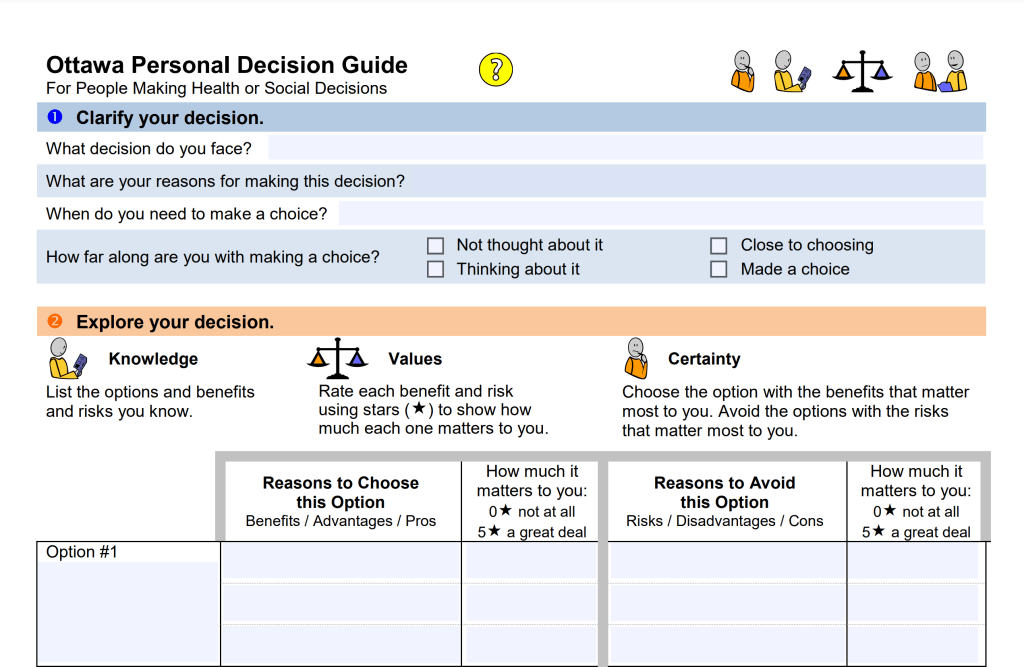We all know what regret feels like. Fear of regret contributes to FOMO (yep! Fear of Missing Out). It makes decisions about treatments, surgery, lifestyle (nutrition, exercise…) for medical or healthcare choices particularly vexing.
But what if there was a way to measure how much regret you might feel if you do or don’t do something? What if you could use AI tools to measure the probability of making the wrong or right decision between two or more choices?
Decisions involve trade-offs. Should I work out or sleep in while on vacation? Should I spend my two free hours hanging out with friends or spend them reading a book that I enjoy? Those are the mundane everyday sorts of trade-offs. But the ones we worry about are more complex and can lead to regrets.
Regret is a multifaceted emotion that arises from the perception of a missed opportunity or a suboptimal choice.
Both healthcare professionals and patients experience regret for choices in healthcare.
I remember the conversation that I had about 8 years ago with Denise (not her real name). She reached out to me because she had heard about my work. We met to discuss her predicament. Denise took a deep breath, her eyes locked on her trembling hands. “Doctor, it’s my autoimmune disease. The treatments available are a double-edged sword. One’s an aggressive medication with potential side effects, while the other is a milder option that might not be as effective. I’m terrified of making the wrong choice.”
Denise sighed, her voice heavy, “I’m scared, Doctor. Scared of the side effects, scared that the mild treatment might not control my symptoms. But I’m also scared of the impact of the aggressive treatment on my daily life. What have others done in my situation?”
Before coming to see me, Denise had spent days and weeks talking to family members and friends. She sought advice from those she trusted. Friends and family offered well-intentioned opinions, some advocating for the aggressive medication’s potential benefits while others urged her to take the less risky route. Each conversation left her with a swirl of emotions – hope, fear, and doubt. She also researched the benefits and risks of the different treatment options.
Denise is all of us. Fear of regret leads to decisional conflict. Decision neuroscientists use the term `decisional conflict’ to describe the mixture of stress and anxiety, hope and fear when the brain is torn between choices with competing options that involve risk, regret and maybe even threats or challenges to personal values or preferences. While decision conflict is common, understanding it and what we can do to better inform our decisions, can help us navigate decisional conflict and possibly potential regret.
There is no way to get through life without experiencing some decisional conflict and regret. But is there a way to measure or at least consider in a structured way how to manage or minimize regret?
It is within this context that AI’s potential to manage regret probabilities becomes relevant.
Leveraging AI for Regret Management
AI’s ability to process and analyze vast datasets enables it to assess complex variables, including patient history, medical records, treatment options, and relevant research. This information can be used to create predictive models that simulate various scenarios and their potential outcomes.
AI algorithms can analyze a vast database of patient cases, taking into account factors like disease severity, treatment outcomes, and side effects. It can provide us with statistical insights that might help inform Denise’s decision. It then processes this data and presents us with potential outcomes for each treatment option.
It’s not about predicting the future, but about using data-driven probabilities to aid understanding. AI doesn’t replace your emotions; it complements them with objective information. If AI algorithms had been in common use when I had the conversation with Denise, I might have told her, “Your physician can input your medical history, disease progression, and preferences into the AI system. It then processes this data and presents us with potential outcomes for each treatment option. It’s like seeing the odds, the numbers behind each choice. It helps you make an informed decision based on a combination of your feelings and scientific data.”
Someday, patients like Denise could tap into the collective knowledge of countless medical cases to better understand their own situations routinely.
Quantifying Probabilities
One of the most intriguing potential aspects of AI algorithms in chronic care decisions is the capacity to quantify probabilities. AI could offer a clearer picture of the likelihood of various outcomes for different treatment choices. This can enable healthcare professionals to quantify the potential benefits and risks associated with each decision, aiding in the selection of options that minimize the likelihood of future regrets. This is not as far-fetched as it first seems. For decades, scientists and healthcare professionals have been using decision aids to assist patients with making serious and challenging decisions. Decision aids (such as the example below) are based on algorithms, that is, a process or set of rules followed when problem-solving. They help by navigating the different treatment options and in reducing decisional conflict.
Decision Support Systems
AI-powered decision support systems can offer evidence-based recommendations by analyzing a vast array of medical literature and research. These systems can consider the latest advancements, clinical trials, and case studies, allowing healthcare professionals to base their decisions on the most up-to-date information available.
Personalized Risk Assessment
AI can potentially assist in assessing the unique risk profile of each patient, considering factors such as medical history, genetics, lifestyle, and current health status. By identifying potential complications and outcomes associated with different treatment options, AI can help healthcare professionals and patients make more informed decisions that align with a patient’s individual circumstances, like Denise’s.
Navigating Information Overload
Keeping up with the latest medical research and treatment advancements is a daunting task. AI’s capability to process vast amounts of medical literature and present relevant information could alleviate the overwhelm, ensuring that patients have access to the up-to-date knowledge when making decisions.
Ethical Considerations and Human Involvement
AI is promising for managing regret probabilities in healthcare decisions. But it’s important to recognize the ethical complexities that are involved. The accuracy of AI predictions heavily relies on the quality and diversity of the data it’s trained on. Biased or incomplete datasets can lead to inaccurate recommendations and poor decision outcomes. And generative AI, in particular, is known to “hallucinate” – a term that computer scientists use to mean that it produces false information or even nonsensical confabulations. In other words, sometimes, it just makes stuff up. While the potential of AI in managing regret probabilities is promising, it’s crucial to remember that healthcare decisions are not solely about numbers and statistical probabilities. The human experience, emotions, and the doctor-patient relationship are essential components that cannot be replaced by algorithms. AI lacks the intuitive understanding that healthcare professionals possess, which enables them to factor in subtle nuances, patient emotions, and other intangible aspects that influence decisions. As AI continues to evolve, we have to strike a balance between the benefits of AI’s data-driven insights and the human element that is intrinsic to compassionate patient care. AI’s role should be complementary, enhancing the decision-making process –like how we have been using decision aids, but in a more powerful and efficient way.
Photo credits: Danie Franco on Unsplash.

